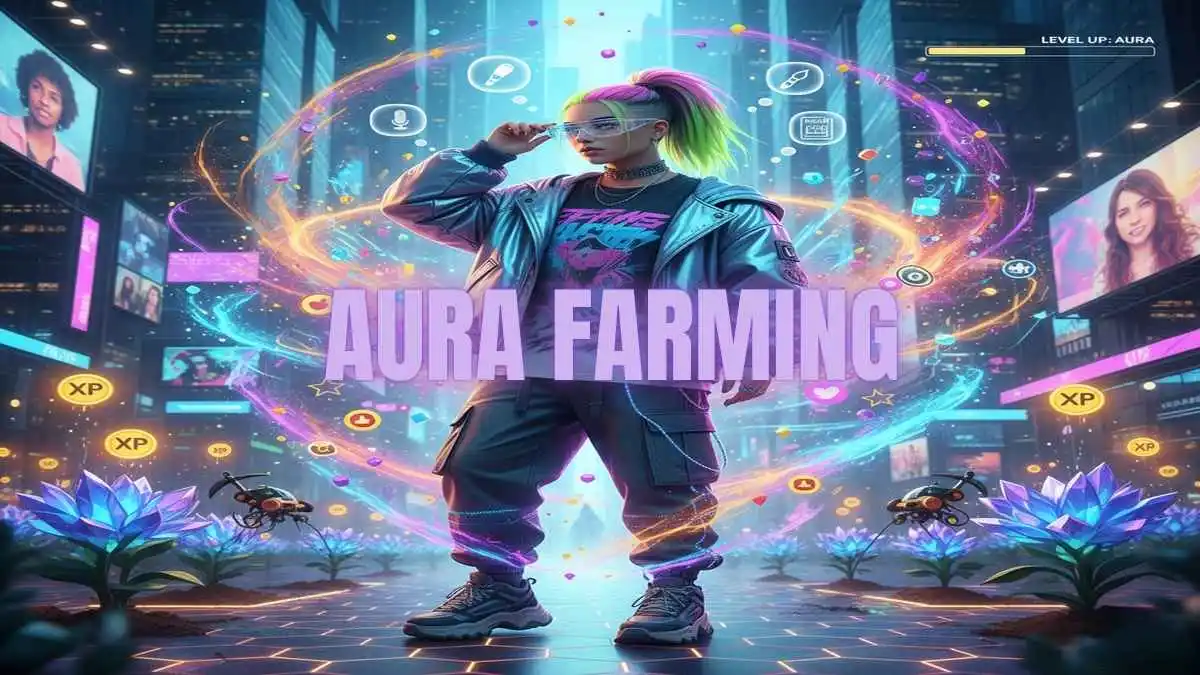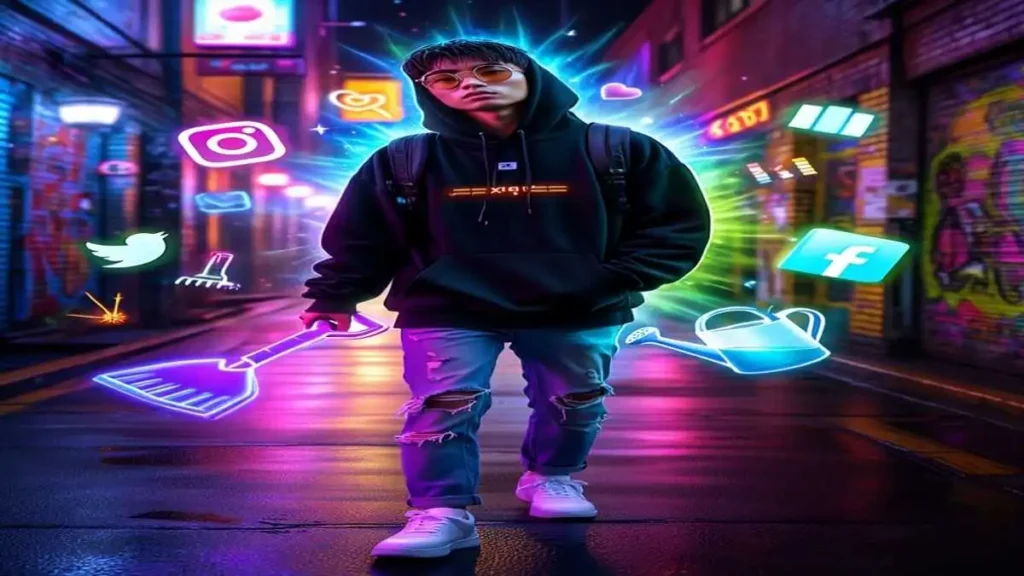GENERAL
Aura Farming: The Viral Slang Shaping Digital Identity

I’ve always been fascinated by how quickly new internet slang emerges and gains popularity in online communities. One of the latest phrases to capture the attention of Gen Z and Gen Alpha is ‘aura farming.’ At first glance, the term might sound unusual, but it captures something deeply familiar in the age of curated identities and digital aesthetics.
Table of Contents
What Is Aura Farming?
At its core, aura farming is the act of carefully cultivating one’s personality, appearance, and online presence to project an “effortlessly cool” and confident vibe. The word “aura” refers to the energy or atmosphere someone gives off, while “farming” is borrowed from gaming culture, where it means repeatedly working at something to build resources or experience points.
Together, the phrase captures the idea of deliberately “growing” a personal aesthetic, both online and offline, until it feels natural and polished.
How the Term Became Popular
Like many expressions from Gen Z slang, aura farming first spread through platforms such as TikTok, Instagram, and Twitter. It reflects a cultural blend of two worlds that younger users are familiar with: video game mechanics and social media self-presentation. Just as gamers grind for points, people grind for vibes.
I’ve noticed that this term resonates because it gives a name to something many people were already doing: curating their vibe. Whether that meant editing photos with a consistent filter, adopting a minimalist lifestyle aesthetic, or sharing playlists that align with a specific mood, people were already doing this.
The Appeal of Aura Farming
- Vibe Culture: Younger generations are highly attuned to intangible energy, what someone gives off in their presence or through their content.
- Digital Aesthetics: Platforms reward carefully crafted visual identities. A feed that “feels right” can gain traction faster.
- Illusion of Effortlessness: Ironically, farming one’s aura often requires a lot of work to look like no work at all.
- Community Recognition: Having the “right vibe” creates a sense of belonging in niche online circles.
What stands out to me is that it is not just about aesthetics, it’s about aligning all aspects of presentation, from clothes to captions, in a way that reinforces a chosen identity.

How Aura Farming Manifests in Everyday Life
When I look around digital spaces, I can see the trend at play in many ways:
- Fashion and Style Choices: Choosing outfits that consistently reinforce a personal brand or aesthetic.
- Social Media Curation: Maintaining feeds with cohesive tones, whether minimalist, colourful, or vintage-inspired.
- Personality Tweaks: Adopting certain humor styles, slang, or conversational rhythms to match an aura.
- Lifestyle Performances: Documenting coffee shop visits, travel experiences, or wellness routines to project a curated life.
Each of these is part of a bigger effort to “farm” the kind of impression one wants to give.
Is Slang Authentic or Performative?
One of the most interesting debates around aura farming is whether it’s authentic or performative. Some view it as harmless self-expression, while others argue that it puts too much pressure on people to maintain a certain appearance.
Personally, I see it as a mix of both. Humans have always been concerned with impression management, choosing how we act and dress to be perceived in a certain way. The digital age just amplifies this, making it more visible and deliberate. The key difference is that today, people openly acknowledge the curation process, sometimes with humor or irony.
Connections to Other Internet Slang
The concept of aura farming overlaps with many other viral expressions:
- Main Character Energy: Living life as though you’re the protagonist of a story.
- Glow Up: Transforming one’s look or confidence over time.
- Rizz: A term for charisma or charm.
- “That Girl” Culture: Aspiring toward wellness-focused, aesthetically pleasing lifestyles.
All of these terms reflect the importance of vibe culture and personality curation in digital identity.
Psychology Behind the Trend
If we look deeper, aura farming aligns with psychological theories like social identity and impression management. People naturally adjust their behavior to fit into groups, gain approval, or create a desired impression. Social media accelerates this by providing instant feedback through likes, shares, and comments.
For Gen Z and Gen Alpha, farming their aura is less about hiding who they are and more about building confidence, experimenting with aesthetics, and finding communities where they feel understood.
Criticisms of Aura Farming
Of course, not everyone views aura farming in a positive light. Some of the criticisms include:
- Pressure to Conform: Not everyone can afford or sustain the lifestyle that a curated image might require.
- Loss of Authenticity: Too much emphasis on appearance may overshadow genuine personality.
- Mental Health Strain: The constant effort to appear effortless can lead to stress and burnout.
- Shallow Validation: A focus on aesthetics risks reducing self-worth to external approval.
My Perspective on the Trend
When I think about aura farming, I see both creativity and challenge. On one hand, it empowers people to experiment with aesthetics, build confidence, and find joy in self-expression. On the other hand, it can create unrealistic standards that leave people feeling like they’re never “enough” unless their vibe matches current trends.
To me, the healthiest approach is balance, using aura farming as a playful tool to explore identity without losing touch with authenticity.
FAQs
1. Is the slang limited to online spaces, or can it happen offline too?
It extends offline as well, influencing how people dress, speak, and carry themselves in real-world settings.
2. Can the term be considered a form of digital branding?
Yes, many view it as a personal branding strategy where individuals manage their image much like companies manage their identity.
3. Does aura farming look different across cultures?
Absolutely, while the concept is global, cultural aesthetics and values shape how different communities “farm” their aura.
Conclusion
In the end, aura farming is more than just a passing slang term. It’s a reflection of how digital generations approach self-expression, blending gaming metaphors with the realities of social media culture. By naming the act of vibe cultivation, it provides younger people with a language to describe something they were already doing: managing their identity, curating their aesthetics, and shaping their aura.
-

 GENERAL8 months ago
GENERAL8 months agoChristofle – For Those Who Dream of Family Heirloom Silver
-

 SPORTS10 months ago
SPORTS10 months agoDiscover the World of Football with Streameast: Watch Your Favorite Leagues and Tournaments
-

 GENERAL2 months ago
GENERAL2 months agoUncovering the World of кинокрадко: The Dark Side of Film Piracy
-

 GENERAL5 months ago
GENERAL5 months agoATFBooru: Anime, Gaming, and Subculture Imageboard























